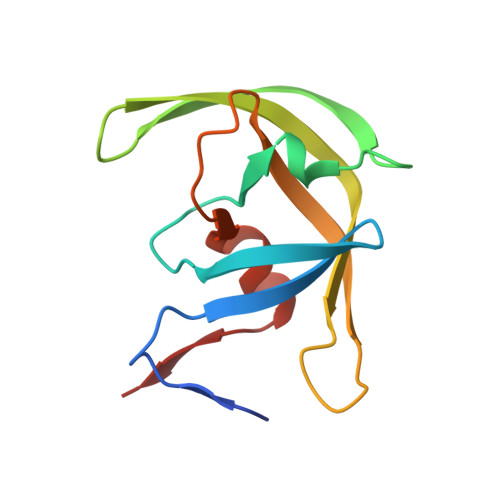Structural basis for drug and substrate specificity exhibited by FIV encoding a chimeric FIV/HIV protease.
Lin, Y.C., Perryman, A.L., Olson, A.J., Torbett, B.E., Elder, J.H., Stout, C.D.(2011) Acta Crystallogr D Biol Crystallogr 67: 540-548
- PubMed: 21636894
- DOI: https://doi.org/10.1107/S0907444911011681
- Primary Citation of Related Structures:
3OGP, 3OGQ - PubMed Abstract:
A chimeric feline immunodeficiency virus (FIV) protease (PR) has been engineered that supports infectivity but confers sensitivity to the human immunodeficiency virus (HIV) PR inhibitors darunavir (DRV) and lopinavir (LPV). The 6s-98S PR has five replacements mimicking homologous residues in HIV PR and a sixth which mutated from Pro to Ser during selection. Crystal structures of the 6s-98S FIV PR chimera with DRV and LPV bound have been determined at 1.7 and 1.8 Å resolution, respectively. The structures reveal the role of a flexible 90s loop and residue 98 in supporting Gag processing and infectivity and the roles of residue 37 in the active site and residues 55, 57 and 59 in the flap in conferring the ability to specifically recognize HIV PR drugs. Specifically, Ile37Val preserves tertiary structure but prevents steric clashes with DRV and LPV. Asn55Met and Val59Ile induce a distinct kink in the flap and a new hydrogen bond to DRV. Ile98Pro→Ser and Pro100Asn increase 90s loop flexibility, Gln99Val contributes hydrophobic contacts to DRV and LPV, and Pro100Asn forms compensatory hydrogen bonds. The chimeric PR exhibits a comparable number of hydrogen bonds, electrostatic interactions and hydrophobic contacts with DRV and LPV as in the corresponding HIV PR complexes, consistent with IC(50) values in the nanomolar range.
Organizational Affiliation:
Department of Immunology and Microbial Science, The Scripps Research Institute, 10550 North Torrey Pines Road, La Jolla, CA 92037, USA.
















